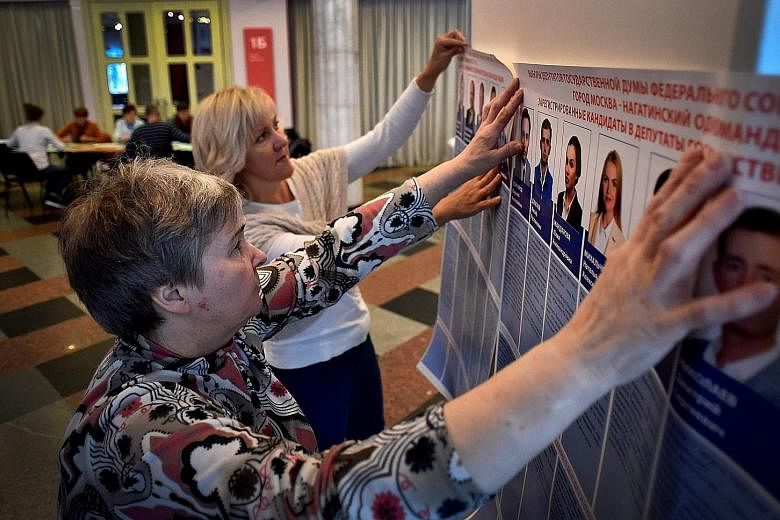Voting is under way in Russia today in a general election for representatives to the State Duma, the Lower House of the country's Parliament. Candidates from 14 parties are competing for the 450 seats in the first national parliamentary elections since December 2011.
The ultimate result of the ballots has always been predictable: United Russia, President Vladimir Putin's party, will remain the biggest single political group. But the share of the vote which the "party of power" attracts today will provide an important indicator of how Russia's political scene is evolving at a time when the country is experiencing its third year of economic recession, and with the presidential elections looming in 2018.
In the outgoing Duma, the United Russia party towered above all others, holding 238 seats, just over half of the total MPs. But that was already a fairly bad result for a political movement which, a decade ago, regularly enjoyed the support of two-thirds of the electorate.
United Russia's share of the vote is certain to fall even further today; the question is by how much. Some independent pollsters suggest that the President's party would get no more than 31 per cent of the ballots. United Russia officials claim to expect around 40 to 42 per cent of the vote, still a poor result for a party which essentially runs Russia single-handedly.
The reason for this constant decline in voters' support is that United Russia is regarded as merely an extension of the government and is often blamed for Russia's vast corruption. Opposition politician Alexei Navalny once memorably described it as the "party of crooks and thieves".

The fact that Russia is mired in an economic crisis stemming largely from low global energy prices and sanctions imposed by Western governments in response to Moscow's forcible annexation of Ukraine's Crimean Peninsula does not help either. Older voters, United Russia's core supporters, are now deserting a party which has presided over declining pensions and soaring food prices.
-
110m
Number of eligible voters across 11 time zones in the world's biggest country.
450
Number of seats to be elected. Half will be according to party lists on the basis of proportional representation, the rest on the first-past-the-post electoral system.
14
Number of parties which are taking part, including a party specifically devoted to pensioners.
12
Number of other parties which refused to take part, including one movement which claims to be devoted to "Good Deeds".
None of this should prevent United Russia from continuing to dominate the Duma, if only because its opponents are likely to remain both weak and divided. The extreme-left Russian Communist Party, heir to those who ruled the Soviet Union, and the Liberal Democratic Party which, despite its name, is an authoritarian, extreme-right nationalist movement, are likely to gain about a quarter of the votes between them, but essentially cancel each other out.
Meanwhile, the opposition which President Putin really fears, that led by pro-Western charismatic activists, has evaporated: Mr Boris Nemtsov, the opposition's most important leader, was gunned down near the President's own office in the Kremlin in February last year, and former world chess champion Garry Kasparov has fled Russia after receiving death threats.
As a result, although smaller opposition parties are projected to get about 20 per cent of the ballots, most will fail to cross the 5 per cent vote threshold required for parliamentary representation. A fifth of all votes cast will, therefore, go to waste, strengthening the governing party's parliamentary control.
And then, there are subtle changes to the electoral system which could boost United Russia's performance. One-half of the 450 deputies this time will be elected from single-candidate constituencies, with the other half elected from party candidate lists. The measure was a concession to demands from the opposition, but the main outcome of the change is that United Russia will benefit most from votes in single-candidate constituencies, since its local politicians are more prominent and better-organised.
Still, the authorities are nervous, not so much because of the outcome of the elections, but more because of fears of a return to the big street protests that followed the last general elections in 2011.
The government has tried to pre-empt opposition claims that the vote would be rigged. It dismissed the head of the Central Election Commission, an individual close to the authorities, and replaced him with Mrs Ella Pamfilova, a former liberal Duma deputy and minister in the Cabinet of President Boris Yeltsin during the 1990s.
But in case this does not prevent dissent, Russia's new National Guard, formed only in April this year, stands ready to ensure that the disturbances which followed the last general elections are not repeated.
Still, the anticipated slow decline in Russia's ruling party should give President Putin some pause for thought, especially since presidential elections are only two years away. Rumours in Moscow suggest that President Putin may well reshuffle his Cabinet soon after the elections, even if this means a mere change of faces, rather than policies.

